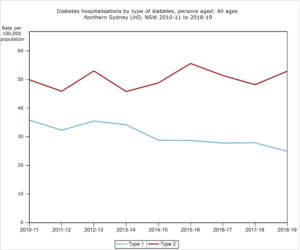
Diabetes is often referred to as a hidden disease. It is an autoimmune disease that can be managed with the right knowledge, self-care, resources and support system. There is no reason you won’t live a close to normal life after a diabetes diagnosis.
In the Northern Sydney Local Health District, hospitalisations of people with type 2 diabetes have increased – contributing to an overall rise in all diabetes types since 2017**. These trends show the importance of learning more about diabetes and the services available to take care of our local community.
We have compiled some frequently asked questions to help you or someone you love living with diabetes.
What is Diabetes?
Diabetes is when the body isn’t able to regulate blood glucose levels and keep them balanced. When you have diabetes your body is incapable of producing enough insulin, lower blood glucose levels, or responding properly to insulin.
What does diabetes do to my body?
The liver, kidneys and pancreas are functions of the endocrine system (pronounced [EN] + [DOH] + [KRYN]).
When you have diabetes, the pancreas cannot produce the insulin that turns the food you eat into energy. The kidneys’ blood vessels are damaged, making the kidneys unable to clean your blood. The liver only responds to the insulin as to when to store and create glucose, depending upon what the body needs.
If diabetes isn’t diagnosed early, your blood pressure levels will become high. In that case, it can lead to further complications like heart disease, stroke, kidney damage, and nerve damage.
The main symptoms of diabetes include:
- being thirstier than usual
- needing to urinate more often
- feeling tired and having no energy
- always feeling hungry
- slowly healing from cuts
- itching, skin infections
- blurred vision
- losing weight for no reason (type 1)
- gradually putting on weight (type 2)
- having mood swings
- having headaches
- feeling dizzy
- getting leg cramps
Are there different types of diabetes?
Yes, there are three main types of diabetes. Each type is managed differently.
- Type 1 Diabetes is where the pancreas does not produce insulin, destroyed by the immune system. People with this autoimmune condition are insulin–dependent and must check their blood glucose levels throughout the day to effectively manage it. Type 1 diabetes is a lifelong disease. Symptoms usually appear in children and adolescents. People with Type 1 Diabetes manage the condition with insulin injections or similar for the rest of their lives.
- Type 2 Diabetes is where the insulin the body develops becomes progressively resistant over a long time, making the insulin the pancreas produces ineffective and depriving the body of enough insulin it needs. It is the most common type of diabetes and is linked to poor lifestyle factors such as poor diet.
- Gestational diabetes is diagnosed in pregnant women when their blood glucose levels appear higher than normal. Gestational Diabetes typically presents around the 24th to 28th week of pregnancy and, for most women, will disappear after the baby’s birth. Management of blood glucose levels is usually achieved through physical activity and healthy eating; in some cases, insulin injections may also be required.
Who can get diabetes?
Anyone can be diagnosed with diabetes. The most common kind of diabetes is type 2.
In Australia it has been found that the higher risk groups for developing diabetes are men aged between 65 and 74 years *.
Can diabetes be managed?
The correct medication will keep blood glucose levels balanced. Accompanied by the right food intake and active lifestyle, you can effectively manage diabetes.
Following a meal plan, doing regular physical activity and keeping detailed reports to check in with your doctor are the best things to help manage diabetes. As diabetes increases your risk of cardiovascular disease^, we’ve also put together a list of activities to do to help manage your heart health.
How many Australians have diabetes?
In 2017-2018 the Australian Institute of Health and Welfare estimated 1.2 million people living with diabetes. However, endocrinologists believe this is more likely 1.7 million people with an estimate of 500,000 people undiagnosed.
How can I help someone I know who has diabetes?
Understanding the impact the disease can have on their body and their lifestyle will help you support your loved one. Doing your research to learn more about the type of diabetes your loved one has will make it easier for you to understand how it will affect them. A diabetes diagnosis can also impact your loved one’s mental health so having regular conversations and letting them know you’re there for support will help them remain positive.
Attending a diabetes support group with your loved one and joining them when exercising are great ways to offer practical support.
In 2017-2018 1.2 million Australians were hospitalised due to diabetes–related illness or injury*. If you or your loved one is feeling unwell with cause for concern, it is a reason to visit your local emergency department.
The NSLHD has a variety of services to support people in the local area with diabetes services and education.
- Ryde Hospital Diabetes Service cares for people of all ages with diabetes. To support Ryde Hospital’s Diabetes Service, you can donate directly on our website here.
- Hornsby Hospital has a diabetes education service that provides individual assessment and diabetes self-management education to support people and carers of people with diabetes. For more information, visit their website here.
- The Kolling Institute’s Renal Team current medical research projects include the non-invasive determination of patients at risk of progressive diabetic/non-diabetic kidney disease by using advanced microscopy techniques. You can support the Kolling Institute’s Renal team by donating directly on our website here.
Important Note: This page’s information should not be substituted for medical advice or used to alter medical therapy. This information is of general description and does not replace consultations with qualified healthcare professionals.
The NORTH Foundation is the official fundraising and engagement partner for the Northern Sydney Local Health District, including Royal North Shore, Ryde and Hornsby Ku-ring-gai Hospitals, and the Kolling Institute.
REFERENCES:
**NSWGovernment Health Stats http://www.healthstats.nsw.gov.au/Indicator/dia_typehos/dia_typehos_lhn_trend?&topic=Diabetes&topic1=topic_dia&code=dia[_]
*AIHW2020 https://www.aihw.gov.au/reports-data/health-conditions-disability-deaths/diabetes/overview
^HRI2021 https://www.hri.org.au/health/learn/cardiovascular-disease/diabetes


